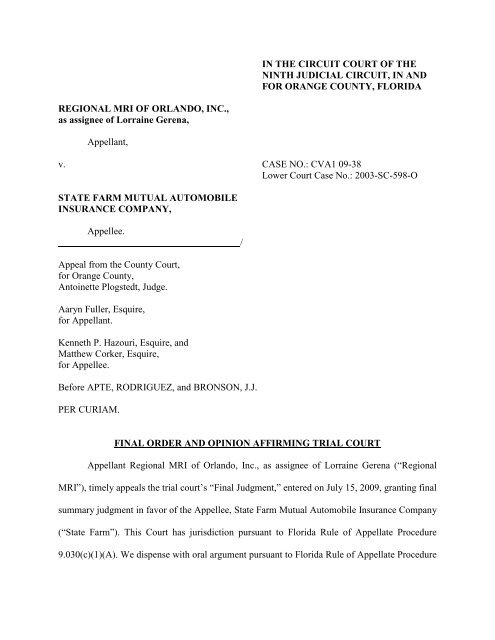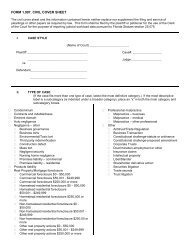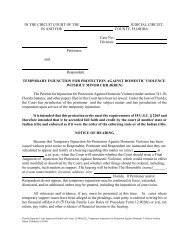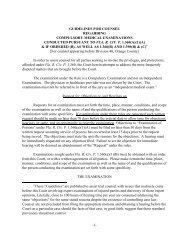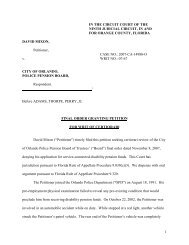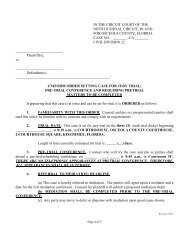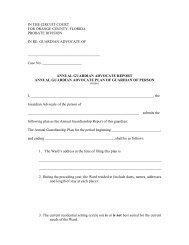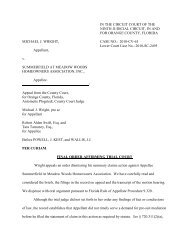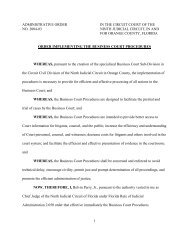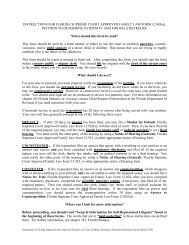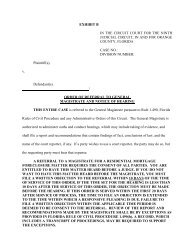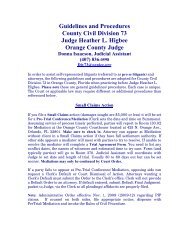in the circuit court of the - Ninth Judicial Circuit Court of Florida
in the circuit court of the - Ninth Judicial Circuit Court of Florida
in the circuit court of the - Ninth Judicial Circuit Court of Florida
Create successful ePaper yourself
Turn your PDF publications into a flip-book with our unique Google optimized e-Paper software.
IN THE CIRCUIT COURT OF THENINTH JUDICIAL CIRCUIT, IN ANDFOR ORANGE COUNTY, FLORIDAREGIONAL MRI OF ORLANDO, INC.,as assignee <strong>of</strong> Lorra<strong>in</strong>e Gerena,Appellant,v. CASE NO.: CVA1 09-38Lower <strong>Court</strong> Case No.: 2003-SC-598-OSTATE FARM MUTUAL AUTOMOBILEINSURANCE COMPANY,Appellee./Appeal from <strong>the</strong> County <strong>Court</strong>,for Orange County,Anto<strong>in</strong>ette Plogstedt, Judge.Aaryn Fuller, Esquire,for Appellant.Kenneth P. Hazouri, Esquire, andMat<strong>the</strong>w Corker, Esquire,for Appellee.Before APTE, RODRIGUEZ, and BRONSON, J.J.PER CURIAM.FINAL ORDER AND OPINION AFFIRMING TRIAL COURTAppellant Regional MRI <strong>of</strong> Orlando, Inc., as assignee <strong>of</strong> Lorra<strong>in</strong>e Gerena (“RegionalMRI”), timely appeals <strong>the</strong> trial <strong>court</strong>’s “F<strong>in</strong>al Judgment,” entered on July 15, 2009, grant<strong>in</strong>g f<strong>in</strong>alsummary judgment <strong>in</strong> favor <strong>of</strong> <strong>the</strong> Appellee, State Farm Mutual Automobile Insurance Company(“State Farm”). This <strong>Court</strong> has jurisdiction pursuant to <strong>Florida</strong> Rule <strong>of</strong> Appellate Procedure9.030(c)(1)(A). We dispense with oral argument pursuant to <strong>Florida</strong> Rule <strong>of</strong> Appellate Procedure
9.320.Facts and Procedural HistoryRegional MRI sued State Farm for <strong>the</strong> payment <strong>of</strong> PIP benefits under an <strong>in</strong>surance policyissued to Lorra<strong>in</strong>e Gerena (“Gerena”). Regional MRI alleged that State Farm failed to paycovered medical expenses result<strong>in</strong>g from a covered motor vehicle accident.On October 21, 2002, Regional MRI provided healthcare services to Gerena. To pay forher treatment, Gerena assigned her PIP benefits under <strong>the</strong> State Farm <strong>in</strong>surance policy toRegional MRI. Therefore, Regional MRI submitted a Health Insurance Claim Form to StateFarm, claim<strong>in</strong>g that <strong>the</strong> treatment resulted from a covered motor vehicle accident. State Farmreceived <strong>the</strong> claim form on October 28, 2002.At <strong>the</strong> time State Farm received Regional MRI’s claim form, Gerena had $531.99 <strong>in</strong>rema<strong>in</strong><strong>in</strong>g PIP benefits under <strong>the</strong> policy. However, on November 20, 2002, before State Farmhad responded to Regional MRI’s claim, State Farm received a claim from Gerena for lostwages. Ei<strong>the</strong>r Regional MRI’s claim or Gerena’s lost wages claim, <strong>in</strong>dividually, would haveexhausted <strong>the</strong> available benefits under <strong>the</strong> policy. On November 26, 2002, State Farm chose topay <strong>the</strong> rema<strong>in</strong><strong>in</strong>g benefits <strong>of</strong> $531.99 to Gerena <strong>in</strong> response to her lost wages claim.After receiv<strong>in</strong>g no payment <strong>in</strong> satisfaction <strong>of</strong> its claim, Regional MRI submitted a presuitdemand letter to State Farm. State Farm responded <strong>in</strong> a letter, <strong>in</strong>dicat<strong>in</strong>g that Gerena’s PIPand medical payment benefits had been exhausted, and <strong>the</strong>refore it would be unable to honor anyfur<strong>the</strong>r medical bills or lost wages claims result<strong>in</strong>g from <strong>the</strong> subject motor vehicle accident.Regional MRI filed suit, dur<strong>in</strong>g which <strong>the</strong> trial <strong>court</strong> entered f<strong>in</strong>al summary judgment <strong>in</strong> favor <strong>of</strong>State Farm, based on <strong>the</strong> defense that Gerena’s PIP benefits had been exhausted before payment<strong>of</strong> Regional MRI’s claim was overdue. This appeal followed.2
Discussion <strong>of</strong> LawOn appeal, Regional MRI argues that <strong>the</strong> trial <strong>court</strong> erred <strong>in</strong> grant<strong>in</strong>g f<strong>in</strong>al summaryjudgment <strong>in</strong> favor <strong>of</strong> State Farm because an <strong>in</strong>surer may be liable for benefits <strong>in</strong> excess <strong>of</strong> <strong>the</strong>policy limits when <strong>the</strong> <strong>in</strong>surer exhausts <strong>the</strong> benefits <strong>in</strong> bad faith, and Regional MRI asserts thatState Farm exhausted Gerena’s benefits <strong>in</strong> bad faith. On <strong>the</strong> contrary, State Farm argues that itdid not act <strong>in</strong> bad faith, and <strong>the</strong>refore, <strong>the</strong> trial <strong>court</strong> did not err <strong>in</strong> grant<strong>in</strong>g f<strong>in</strong>al summaryjudgment <strong>in</strong> its favor.The standard <strong>of</strong> review for an order grant<strong>in</strong>g summary judgment is de novo. VolusiaCounty v. Aberdeen at Ormond Beach, 760 So. 2d 126, 130 (Fla. 2000). The <strong>Court</strong> mustdeterm<strong>in</strong>e whe<strong>the</strong>r <strong>the</strong>re is a “genu<strong>in</strong>e issue as to any material fact” and whe<strong>the</strong>r “<strong>the</strong> mov<strong>in</strong>gparty is entitled to a judgment as a matter <strong>of</strong> law.” Krol v. City <strong>of</strong> Orlando, 778 So. 2d 490, 491-92 (Fla. 5th DCA 2001) (cit<strong>in</strong>g Fla. R. Civ. P. 1.510(c)).Whe<strong>the</strong>r an <strong>in</strong>surer has acted <strong>in</strong> bad faith is generally a question <strong>of</strong> fact. Vest v. TravelersIns. Co., 753 So. 2d 1270, 1275 (Fla. 2000). Therefore, Regional MRI argues that <strong>the</strong>re is agenu<strong>in</strong>e issue <strong>of</strong> material fact as to whe<strong>the</strong>r State Farm acted <strong>in</strong> bad faith. However, a review <strong>of</strong><strong>the</strong> parties’ arguments demonstrates that it is not essentially facts that are disputed, but ra<strong>the</strong>r, <strong>the</strong>parties disagree upon <strong>the</strong> legal conclusion to be drawn from undisputed facts.Regional MRI does not argue that State Farm <strong>in</strong>tentionally acted <strong>in</strong> bad faith. Ra<strong>the</strong>r,Regional MRI contends that State Farm’s undisputed actions constitute bad faith. Specifically,State Farm received Regional MRI’s claim before it received Gerena’s lost wages claim. StateFarm’s usual practice is to pay claims <strong>in</strong> <strong>the</strong> order <strong>in</strong> which <strong>the</strong>y are received. By pay<strong>in</strong>gGerena’s lost wages claim ahead <strong>of</strong> Regional MRI’s claim, State Farm did not follow its usualpractice. State Farm does not argue that Regional MRI’s claim was not compensable—but for3
<strong>the</strong> exhaustion <strong>of</strong> benefits—and State Farm cannot expla<strong>in</strong> why it paid Gerena’s claim ahead <strong>of</strong>Regional MRI’s claim. Therefore, Regional MRI argues, State Farm’s failure to adhere to itsown usual practice constitutes an exhaustion <strong>of</strong> benefits <strong>in</strong> bad faith, and thus Regional MRIseeks a judgment compell<strong>in</strong>g State Farm to pay its claim, over and above <strong>the</strong> policy limits.The facts upon which Regional MRI relies to demonstrate that State Farm acted <strong>in</strong> badfaith are not <strong>in</strong> dispute. Ra<strong>the</strong>r, <strong>the</strong> parties disagree as to whe<strong>the</strong>r <strong>the</strong> undisputed, underly<strong>in</strong>gfacts concern<strong>in</strong>g State Farms actions constitute bad faith. When <strong>the</strong> underly<strong>in</strong>g facts, those whicha party argues constitute bad faith, are undisputed, <strong>the</strong> question <strong>of</strong> whe<strong>the</strong>r those undisputed factsconstitute bad faith is a question <strong>of</strong> law. See Town <strong>of</strong> Palm Beach v. Palm Beach Cty., 460 So.2d 879, 881-82 (Fla. 1984) (hold<strong>in</strong>g that, where facts are undisputed, <strong>the</strong> legal effect <strong>of</strong> thosefacts is a question <strong>of</strong> law). Therefore, <strong>the</strong>re are no genu<strong>in</strong>e issues <strong>of</strong> material fact, and we mustanswer <strong>the</strong> legal question <strong>of</strong> whe<strong>the</strong>r <strong>the</strong> undisputed material facts concern<strong>in</strong>g State Farm’sactions constitute bad faith. In do<strong>in</strong>g so, we must determ<strong>in</strong>e whe<strong>the</strong>r State Farm is entitled to ajudgment as a matter <strong>of</strong> law.Bad Faith As a Matter <strong>of</strong> LawA claim for PIP benefits is overdue if it is not paid “with<strong>in</strong> 30 days after <strong>the</strong> <strong>in</strong>surer isfurnished written notice <strong>of</strong> <strong>the</strong> fact <strong>of</strong> a covered loss and <strong>of</strong> <strong>the</strong> amount <strong>of</strong> same.” §627.736(4)(b), Fla. Stat. (2002). An <strong>in</strong>surer is considered to be “furnished” with written notice <strong>of</strong><strong>the</strong> fact <strong>of</strong> a covered loss when <strong>the</strong> <strong>in</strong>surer receives <strong>the</strong> written notice. See Ivey v. Allstate Ins.Co., 774 So. 2d 679, 684 (Fla. 2000) (us<strong>in</strong>g <strong>the</strong> concept <strong>of</strong> “furnish<strong>in</strong>g” an <strong>in</strong>surer with writtennotice <strong>in</strong>terchangeably with <strong>the</strong> <strong>in</strong>surer “receiv<strong>in</strong>g” written notice). However, absent a show<strong>in</strong>g<strong>of</strong> bad faith, a PIP <strong>in</strong>surer is not liable to pay benefits once <strong>the</strong> benefits under <strong>the</strong> policy havebeen exhausted. Progressive Am. Ins. Co. v. Stand-Up MRI <strong>of</strong> Orlando, 990 So. 3d 3, 4 (Fla. 5th4
DCA 2008).State Farm received Regional MRI’s claim on October 28, 2002. Therefore, RegionalMRI’s claim would have been overdue on November 27, 2002. However, State Farm receivedGerena’s lost wages claim on November 20, 2002, before it responded to Regional MRI’s claim.State Farm paid Gerena’s lost wages claim on November 26, 2002, exhaust<strong>in</strong>g Gerena’s PIPbenefits. Therefore, Gerena’s PIP benefits were exhausted before Regional MRI’s claim becameoverdue.Regional MRI has failed to produce any legal authority to support its argument that StateFarm’s actions constitute bad faith. All <strong>of</strong> <strong>the</strong> case law <strong>of</strong>fered by Regional MRI is significantlydist<strong>in</strong>guishable from <strong>the</strong> <strong>in</strong>stant matter. In Coral Imag<strong>in</strong>g Servs. v. Geico Indem. Ins. Co., 955So. 2d 11 (Fla. 3d DCA 2006), <strong>the</strong> <strong>in</strong>surer was forced to pay benefits over and above <strong>the</strong> policylimits because it had paid untimely bills ahead <strong>of</strong> <strong>the</strong> compla<strong>in</strong><strong>in</strong>g provider’s claim. Id. at 12. The<strong>court</strong> held that <strong>the</strong> PIP statutes prohibit an <strong>in</strong>surer from apply<strong>in</strong>g PIP benefits to pay untimelyclaims. Id. at 16. Therefore, <strong>the</strong> payments made pursuant to <strong>the</strong> untimely bills were deemed“gratuitous” and not made aga<strong>in</strong>st <strong>the</strong> limits <strong>of</strong> <strong>the</strong> policy. Id.Unlike Coral Imag<strong>in</strong>g, Gerena’s lost wages claim was not untimely, and Regional MRIdoes not argue that any o<strong>the</strong>r claims paid ahead <strong>of</strong> its own were untimely. Fur<strong>the</strong>rmore, <strong>the</strong><strong>in</strong>surer <strong>in</strong> Coral Imag<strong>in</strong>g was not found to have acted <strong>in</strong> bad faith, and relief was grantedpursuant to a <strong>the</strong>ory o<strong>the</strong>r than bad faith. Therefore, Coral Imag<strong>in</strong>g is both factually and legallydist<strong>in</strong>ct from <strong>the</strong> <strong>in</strong>stant matter, and its hold<strong>in</strong>g does not apply.Regional MRI also relies upon Oakland Park MRI, Inc. v. USAA Cas. Ins. Co., 17 Fla. L.Weekly Supp. 477a (Fla. Broward Cty. Ct. Feb. 22, 2010), a county <strong>court</strong> decision that is notb<strong>in</strong>d<strong>in</strong>g upon this <strong>Court</strong>. Irrespective <strong>of</strong> its weight <strong>of</strong> authority, its hold<strong>in</strong>g could not apply5
ecause its material facts are substantially dist<strong>in</strong>ct from <strong>the</strong> <strong>in</strong>stant matter. In Oakland Park MRI,<strong>the</strong> <strong>in</strong>sured had $10,000 <strong>in</strong> available PIP benefits when <strong>the</strong> <strong>in</strong>surer received <strong>the</strong> compla<strong>in</strong><strong>in</strong>gprovider’s claim. Id. The published op<strong>in</strong>ion is unclear as to whe<strong>the</strong>r <strong>the</strong> PIP benefits wereexhausted before <strong>the</strong> claim became overdue, as is <strong>the</strong> case <strong>in</strong> <strong>the</strong> <strong>in</strong>stant matter, or after <strong>the</strong> claimbecame overdue. Therefore, <strong>the</strong> hold<strong>in</strong>g <strong>in</strong> Oakland Park MRI could not be dispositive <strong>in</strong> <strong>the</strong><strong>in</strong>stant matter. 1There is no published appellate case law establish<strong>in</strong>g whe<strong>the</strong>r an <strong>in</strong>surer acts <strong>in</strong> bad faithwhen it pays an <strong>in</strong>sured’s claim ahead <strong>of</strong> an assignee’s claim, and <strong>the</strong>reby exhausts <strong>the</strong> <strong>in</strong>sured’sPIP benefits, when <strong>the</strong> assignee’s claim was received first but had not yet become overdue.Fur<strong>the</strong>rmore, this <strong>Court</strong> is not aware <strong>of</strong>, nor could we f<strong>in</strong>d, any case law hold<strong>in</strong>g that an <strong>in</strong>surer’sfailure to abide by its own usual practice constitutes bad faith. Thus, <strong>in</strong> <strong>the</strong> absence <strong>of</strong> b<strong>in</strong>d<strong>in</strong>gauthority, we f<strong>in</strong>d that an <strong>in</strong>surer’s failure to follow its own typical or usual practice isimmaterial, absent an allegation that <strong>the</strong> <strong>in</strong>surer <strong>in</strong>tentionally sought to benefit itself or harm apla<strong>in</strong>tiff <strong>in</strong> bad faith.Though <strong>the</strong>re is no b<strong>in</strong>d<strong>in</strong>g precedent dispositive <strong>of</strong> <strong>the</strong> specific material facts <strong>in</strong> <strong>the</strong><strong>in</strong>stant matter, we f<strong>in</strong>d <strong>the</strong> follow<strong>in</strong>g language to be <strong>in</strong>structive:The [<strong>in</strong>surer] did noth<strong>in</strong>g wrong here. [It was] under a contract to <strong>the</strong> <strong>in</strong>sured for alimited amount. [It] paid that amount <strong>in</strong> toto. [It is] not responsible for <strong>the</strong><strong>in</strong>sured’s over-use <strong>of</strong> [<strong>the</strong>] policy. The [<strong>in</strong>surer] did not ga<strong>in</strong> anyth<strong>in</strong>g out <strong>of</strong> [its]actions. [It] fully performed [its] contract with <strong>the</strong> <strong>in</strong>sured. It is to <strong>the</strong> <strong>in</strong>sured that<strong>the</strong> assignees should look for any additional payments.. . . .There is no logical basis for any allegation <strong>of</strong> bad faith <strong>in</strong>volved here, on <strong>the</strong> part<strong>of</strong> <strong>the</strong> [<strong>in</strong>surer].1 Fur<strong>the</strong>rmore, Regional MRI’s reliance upon <strong>the</strong> Broward County <strong>Court</strong>’s application <strong>of</strong> <strong>the</strong> English Rule <strong>in</strong>Oakland Park MRI could not avail <strong>in</strong> <strong>the</strong> <strong>in</strong>stant matter because <strong>the</strong> English Rule only applies to claims <strong>of</strong>compet<strong>in</strong>g assignees. See Boulevard Nat’l Bank <strong>of</strong> Miami v. Air Metal Indus., Inc., 176 So. 2d 94 (Fla. 1965).6
Stand-Up MRI, 990 So. 3d at 6-7 (quot<strong>in</strong>g, with approval, Neuro-Imag<strong>in</strong>g Assocs., P.A. v.Nationwide Ins. Co. <strong>of</strong> Fla., 10 Fla. L. Weekly Supp. 738a (Fla. Palm Beach Cty. Ct. Jan. 7,2002)).Whe<strong>the</strong>r State Farm decided to pay Regional MRI’s claim or Gerena’s lost wages claim,it would have only been responsible to pay $531.99. State Farm elected to pay <strong>the</strong> rema<strong>in</strong>der <strong>of</strong><strong>the</strong> <strong>in</strong>sured’s PIP benefits directly to <strong>the</strong> <strong>in</strong>sured. The <strong>in</strong>sured’s PIP benefits were exhaustedbefore Regional MRI’s claim became overdue. State Farm fully performed its duties under <strong>the</strong>policy contract, and it ga<strong>in</strong>ed noth<strong>in</strong>g out <strong>of</strong> its decision to pay Gerena’s lost wages claim ahead<strong>of</strong> Regional MRI’s claim. Therefore, we f<strong>in</strong>d that State Farm did not act <strong>in</strong> bad faith, and it isentitled to a judgment as a matter <strong>of</strong> law.Attorney’s FeesState Farm served an <strong>of</strong>fer <strong>of</strong> settlement on Regional MRI <strong>in</strong> October 2003. RegionalMRI rejected <strong>the</strong> <strong>of</strong>fer, and State Farm subsequently obta<strong>in</strong>ed a judgment <strong>of</strong> no liability from <strong>the</strong>trial <strong>court</strong>. In <strong>the</strong> <strong>in</strong>stant appeal, State Farm filed a motion for appellate attorney’s fees pursuantto <strong>Florida</strong> Rule <strong>of</strong> Appellate Procedure 9.400(b), and State Farm has prevailed <strong>in</strong> this matter, aswe affirm <strong>the</strong> trial <strong>court</strong>’s judgment <strong>in</strong> favor <strong>of</strong> State Farm. Therefore, we f<strong>in</strong>d that State Farm isentitled to an award <strong>of</strong> appellate attorney’s fees pursuant to section 768.79, <strong>Florida</strong> Statutes.Based on <strong>the</strong> forego<strong>in</strong>g, it is hereby ORDERED AND ADJUDGED that <strong>the</strong> trial <strong>court</strong>’s“F<strong>in</strong>al Judgment,” entered on July 15, 2009, is AFFIRMED; and <strong>the</strong> “Appellee’s Motion forAppellate Attorney’s Fees is GRANTED, <strong>the</strong> assessment <strong>of</strong> which is REMANDED to <strong>the</strong> trial<strong>court</strong>.7
DONE AND ORDERED <strong>in</strong> Chambers, at Orlando, Orange County, <strong>Florida</strong> on this <strong>the</strong>_____23_____ day <strong>of</strong> ___February_________________, 2011.__/S/_________________________ALAN S. APTE<strong>Circuit</strong> Judge_/S/___________________________JOSE R. RODRIGUEZ<strong>Circuit</strong> Judge_/S/__________________________THEOTIS BRONSON<strong>Circuit</strong> JudgeCERTIFICATE OF SERVICEI HEREBY CERTIFY that a true and correct copy <strong>of</strong> <strong>the</strong> forego<strong>in</strong>g Order has beenfurnished via U.S. mail to: Aaryn Fuller, Esq., Bog<strong>in</strong>, Munns & Munns, P.A., 2601Technology Drive, Orlando, <strong>Florida</strong> 32802-2807; Kenneth P. Hazouri, Esq., deBeaubien,Knight, Simmons, Mantzaris & Neal, LLP, 332 North Magnolia Avenue, Orlando, <strong>Florida</strong>32801; and Mat<strong>the</strong>w Corker, Esq., Conroy, Simberg, Ganon, Krevans, Abel, Lurvey,Morrow & Schefer, P.A., 2 South Orange Avenue, Suite 300, Orlando, <strong>Florida</strong> 32801 on <strong>the</strong>_____23_____ day <strong>of</strong> ______February______________, 2011._/S/__________________________<strong>Judicial</strong> Assistant8


